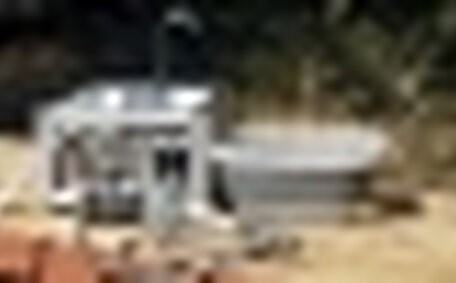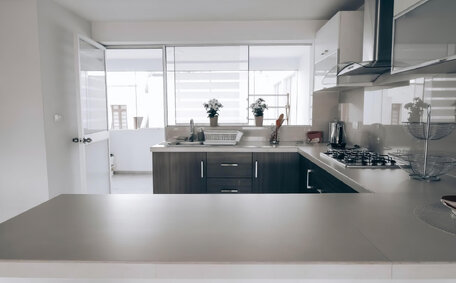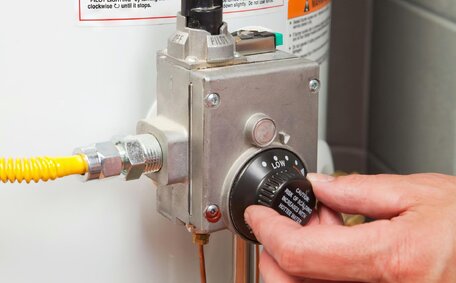Introduction to Natural Gas and Propane
Natural gas, mainly consisting of methane, and propane are popular fuels for heating, cooking, and household use. The former is distributed through underground pipelines and the latter is provided in tanks.
Propane, or LPG (liquefied petroleum gas), results from refining natural gas and oil and is conveniently stored in tanks for transport and use.
At Riverwood Plumbing, we have extensive experience working with both propane and compressed natural gas CNG systems across the Sydney area.
Our expertise extends to both piped-in natural gas and refillable propane tanks, ensuring you select the most suitable fuel option for your specific requirements.
Each fuel type offers efficient energy for appliances; understanding their differences is key to informed decisions regarding installations and heating or cooking needs.
In this article, we’ll explore the key aspects between natural gas propane when it comes to characteristics, energy efficiency, costs, environmental impact, storage and delivery methods, and performance in heating systems, ranges, outdoor grills and more.
Comparing the Energy Efficiency: BTUs per Cubic Foot
When comparing the energy efficiency of fuel sources, one important measure is BTUs or British Thermal Units. BTUs measure the energy released upon burning fuel. For household heating and cooking applications, the key comparison to make is BTUs per one cubic foot.
Propane delivers approximately 91,500 BTUs per cubic foot, over 2.5 times the 36,000 BTUs per cubic foot provided by natural gas.
What does this mean in practical terms?
Due to its higher BTU rating, propane releases more than twice as much heat energy as natural gas when the same volume of gas is burned. Thus, if propane and natural gas appliances use the same volume of fuel, propane will yield substantially more heat.
The upside is that propane allows appliances to reach higher temperatures in less time. On the downside, propane’s efficiency comes at a cost – being more expensive than natural gas per British thermal unit.
Understanding the key difference between propane and natural gas appliances allows you to make more efficient decisions when choosing the right option for your home. Our team at Riverwood Plumbing can also advise on the best fuel options to meet your household’s unique needs.
Cost Comparison Factors
When deciding between natural gas and propane, it’s important to compare the costs beyond just the market price per unit. There are several key factors that impact the overall costs of each system over time:
Upfront Appliance and Installation Costs
The upfront expense of buying and installing new natural gas or propane appliances can vary widely. Propane appliances and tanks generally cost more than natural gas units connected to existing utility pipelines. Yet, for remote properties, the lower ongoing costs of natural gas can offset the initial expense of installing a gas line.
Energy Efficiency Differences
Considering propane’s higher BTU content per cubic foot, it offers more energy for the cost compared to natural gas when evaluated on a BTU per dollar basis.
Market Prices and Availability
The costs of natural gas and propane fluctuate and vary by region. Market volatility, seasonal demand shifts and other factors influence rates over time. Availability also differs, with natural gas dependent on existing pipeline infrastructure.
Delivery and Tank Fees
Natural gas reaches homes through pipelines with no delivery charges, while propane users need to account for tank refills. Ongoing expenses include tank rental, replacements, refills, and transport fees.
Understanding these cost elements allows for a more precise prediction of long-term financial outlay. Engage with our Riverwood Plumbing team for expert advice when considering significant energy decisions for your home.
Environmental Impact
When it comes to environmental impact, both natural gas and propane offer some advantages over other fossil fuels like coal and oil. They produce less air pollution when burned and are considered lower-emission energy sources.
However, some key differences in gas nonrenewable sources exist:
Methane Leaks
Natural gas is primarily composed of methane, which is a potent greenhouse gas. Leaks from pipelines, storage facilities and appliances can release unburned methane into the atmosphere and contribute to climate change.
Clean Burning
Propane, considered the cleanest burning fossil fuel, emits fewer pollutants like nitrogen oxide and sulphur dioxide per BTU than natural gas.
The reduced emissions make propane a preferred choice for generators and vehicles over gasoline or diesel, with many appliances now boasting an Eco-Friendly certification.
At Riverwood Plumbing, we stay up to date on the latest environmentally friendly gas appliances and can recommend the best options to reduce your home’s carbon footprint whether you use natural gas or propane.
Safety Considerations
There are crucial safety protocols to adhere to when dealing with flammable gases. Both cleanburning natural gas and propane systems require proper installation, usage, storage and maintenance to ensure safe operation.
Natural Gas Safety
Natural gas pipelines and appliances must meet strict safety codes. While rare, leaks can occur due to damage, wear and tear or incorrect appliance setups. A 'rotten egg’ odour may signal a leak. In such cases, evacuate promptly and reach out to emergency services.
Certified professionals like our team at Riverwood Plumbing handle all aspects of natural gas systems - from line installation to appliance hookups. Regular inspections assist in early leak detection and ensure compliance with safety standards.
Propane Safety
As propane is heavier than air, leaks tend to gather in low spots rather than dissipate. Caution is essential when handling portable propane tanks. Keep them upright and never store in basements or below ground spaces where gas could accumulate.
Ensure appliances are inspected before winter months when propane demands increase. Poorly maintained equipment raises the risk of malfunctions and leaks. Propane tanks should also remain at least 10 feet from any ignition sources.
Riverwood Plumbing specialises in propane service and repairs year-round. We ensure propane appliances run efficiently while identifying any lurking hazards through periodic safety checks.
Storage and Delivery Methods
When it comes to storage and delivery, there are some key differences between how natural gas and propane systems are set up.
Natural Gas Delivery
Natural gas is delivered through a network of underground pipelines from reservoirs to directly supply homes and businesses.
Natural gas we use that is stored through pipelines is extremely reliable during normal conditions. As long as homes have an active utility account, the supply of piped gas we use is available on demand whenever appliances are switched on.
Propane Delivery
Instead of pipelines, propane is stored onsite in pressurised tanks and cylinders. Delivery is periodic based on usage and involves transport trucks refilling propane tanks on location.
Homeowners must monitor propane levels and schedule delivery trucks for tank refills as needed. Propane necessitates additional planning compared to the continuous availability of natural gas. However, propane delivery services are generally very reliable in most regions.
Comparing Storage Methods
Natural gas is stored in large regional facilities and piped as needed, while propane requires individual storage tanks on each property.
Natural gas storage is out of sight for consumers, whereas propane users must manage onsite tanks, considering capacity, refills, and leak prevention.
When considering gas appliances and heating solutions for your home, the Riverwood Plumbing team can advise on the storage and delivery differences between natural gas and propane in your local area.
Usage in Household Appliances
Both natural gas and propane can power a wide variety of household appliances, including stoves, ovens, clothes dryers, water heaters and space heaters. They are commonly used fuels across residential cooking, laundry and climate control applications.
Appliances designed for dual-fuel use can operate with either natural gas or propane, with some allowing straightforward conversion between the fuels.
Cooking Appliances
Modern household ranges and cooktops often perform equally well using natural gas or propane. Burners are designed to meet performance standards with both fuels. While propane’s higher BTU rating produces faster heat-up times, it can fuel your cooking tasks with little practical difference.
One exception is outdoor kitchens and grills. Propane’s portability allows for flexible placement, unlike fixed natural gas lines. Propane is also better suited for cooking tasks requiring intense or prolonged heat like wok stir-frying, deep frying or smoking large cuts of meat low and slow.
Heating Appliances
Furnaces and central heating systems can utilise either fuel. Propane heating may better suit homes in extreme cold climates. Both types of systems have similar maintenance costs.
But at peak output, propane heaters can raise household temperatures marginally faster thanks to higher potential BTUs.
The pipeline delivery of natural gas ensures reliability, especially in winter, whereas propane users need to closely watch tank levels to prevent depletion in cold weather.
Our team at Riverwood Plumbing can provide trusted guidance on the best fuel options for your home’s heating and cooking appliances. Contact us to evaluate your needs today.
Making the Right Choice for Your Home
Deciding between natural gas and propane requires evaluating key considerations:
Availability & Access
Firstly, determine the availability of natural gas lines in your area or the ease of procuring propane to guide your primary decision.
Upfront & Operating Costs
Compare both the upfront expenses (appliances, potential line installations) as well as ongoing costs like fuel rates and delivery fees. Get quotes for total cost projections.
Lifestyle & Usage Factors
Consider your energy needs for cooking and heating, as propane’s mobility might provide extra advantages.
Environmental Considerations
Propane’s cleaner burn, producing less pollution and greenhouse gases, along with the absence of natural gas methane leaks, should align with your environmental values when choosing.
In the end, the right energy solution depends on your household’s unique needs. Contact the team at Riverwood Plumbing on 1300 349 338 or at [email protected] for personalised advice on whether natural gas or propane is best for your home.






